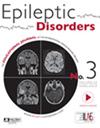Seizure emergency code strategy: Improving treatment times and hospital outcomes for patients with urgent epileptic seizures
Abstract
Objective
Timely treatment is one of the most relevant prognostic factors in patients with urgent epileptic seizures. Despite the available evidence, treatment times remain suboptimal. The aim of this study was to demonstrate the impact of the “seizure code” in an emergency department, focusing on both treatment times and hospital outcomes of patients with urgent epileptic seizures.
Methods
An ambispective cohort study was conducted in the emergency department of a public hospital in Bogotá, Colombia. Treatment times and hospital outcomes were evaluated both before and after the implementation of the seizure code.
Results
A total of 336 patients were included (94 in the pre-seizure code period and 242 in the post-seizure code period). Both cohorts were comparable in terms of clinical and demographic baseline characteristics. After the implementation of the seizure code, in-hospital treatment times improved among patients with status epilepticus and seizure cluster. For the group of patients with status epilepticus, the time from arrival to the first benzodiazepine decreased from a median of 100.5 min (IQR: 43–152.5) to a median of 20 min (IQR: 10–45) (p = .0063), and the time from arrival to the first non-benzodiazepine antiseizure medication decreased from a median of 155 min (IQR: 49–194) to a median of 39 min (IQR: 25–57) (p = .0071). For the group of patients with seizure cluster, the time from arrival to the first non-benzodiazepine antiseizure medication decreased from a median of 296 min (IQR: 112.5–409) to a median of 72 min (IQR: 46–111) (p < .001). The seizure code significantly decreased the risk of inappropriate benzodiazepine use (p = .0087), in-hospital seizure recurrence (p < .001), in-hospital mortality (p = .0074), and prolonged hospitalizations (more than 48 h) (p = .0475).
Significance
The seizure code shortens the time to treatment, reduces the length of hospital stay, decreases the risk of inappropriate benzodiazepine use, and lowers both the in-hospital seizure recurrence and in-hospital mortality among patients with urgent epileptic seizures.

 求助内容:
求助内容: 应助结果提醒方式:
应助结果提醒方式:


